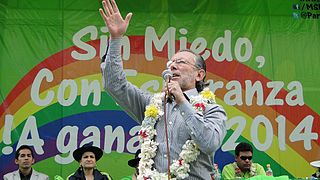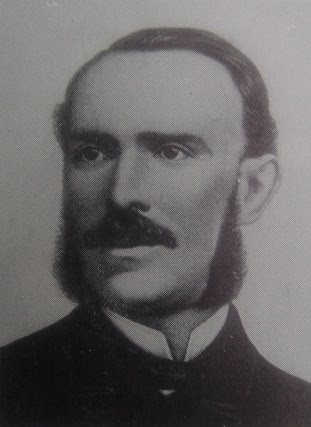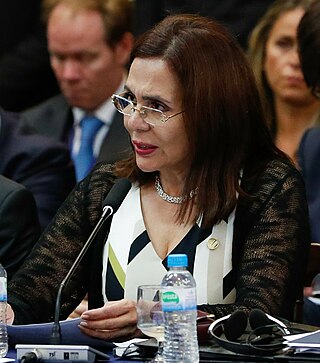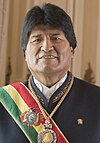
Gonzalo Sánchez de Lozada Sánchez Bustamante,often referred to as Goni,is a Bolivian businessman and politician who served as the 61st president of Bolivia from 1993 to 1997 and from 2002 to 2003. A member of the Revolutionary Nationalist Movement (MNR),he previously served as minister of planning and coordination under Víctor Paz Estenssoro and succeeded him as the MNR's national chief in 1990.

Gualberto Villarroel López was a Bolivian military officer who served as the 39th president of Bolivia from 1943 to 1946. A reformist,sometimes compared with Argentina's Juan Perón,he is nonetheless remembered for his alleged fascist sympathies and his violent demise on 21 July 1946.

Ismael Montes Gamboa was a Bolivian general and political figure who served as the 26th president of Bolivia twice nonconsecutively from 1904 to 1909 and from 1913 to 1917. During his first term,the Treaty of Peace and Friendship with Chile was signed on October 20,1904.
Federico Díez de Medina (1839–1904) was born in La Paz,Bolivia. Bolivian Minister of Foreign Relations and Worship and Dean of the Universidad Mayor de La Paz (1878). Politician and writer,he served as Bolivian ambassador throughout South America. He wrote several texts on international law,politics,and international relations.

Jaime Sáenz Guzmán was a Bolivian writer,poet,novelist,journalist,essayist,illustrator,dramaturge,and professor,known best for his narrative and poetic works. His poetry,though individual to the point of being difficult to classify,bears some similarities with surrealist literature.

Álvaro Marcelo García Linera is a Bolivian politician,sociologist,Marxist theoretician,and former guerilla who served as the 38th vice president of Bolivia from 2006 to 2019. A member of the Movement for Socialism,in the early 1990s he was a leader of the Túpac Katari Guerrilla Army.
The Revista Boliviana de Química is a Bolivian scientific journal in chemistry. It was founded in 1977 and is published by the Facultad de Ciencias Puras y Naturales Publicación de la Carrera de Química,Carrera de Química at the Campus Universitario Cota Cota,in La Paz. The journal was not published from 1980 to 1982.
Patacamaya or Patak Amaya (Aymara) is a city in Bolivia,situated in the La Paz Department. It is the seat of the Patacamaya Municipality,the fifth municipal section of the Aroma Province. Patacamaya lies in the Altiplano,approximately 100 km southeast of La Paz. It contains the intersection between 'Carretera 1' which goes from La Paz to Oruro,as well as Cochabamba,and the 'Carretera Arica-La Paz'. The 'Tambo Quemado' highway is one of the most important international roads that travels through Bolivia.

Universidad Mayor de San Andrés or UMSA is the leading public university in Bolivia,established since 1830 in the city of La Paz. UMSA is the second-oldest university in Bolivia,after the University of San Francisco Xavier de Chuquisaca (1624).

Juan Fernando del Granado Cosío,often referred to as Juan Sin Miedo, is a Bolivian human rights lawyer and politician who served as mayor of La Paz from 2000 to 2004 and 2005 to 2010. A member of the Fearless Movement,of which he was leader,he previously served as a member of the Chamber of Deputies from La Paz from 1993 to 1999.

Nataniel Aguirre,was a Bolivian lawyer,diplomat,politician,writer,and historian. Menéndez y Pelayo considers his novel Juan de la Rosa the best 19th century novel in Spanish America.

Diego Pary Rodríguez is a Bolivian Quechua indigenous leader,educator,politician and diplomat. He served as Advisor to the Bolivian Constituent Assembly of 2006-07 and as Vice Minister of Higher Education. From 2011 to 2018 he served as Ambassador of Bolivia to the Organization of American States (OAS) and Concurrent Ambassador of Bolivia to Trinidad and Tobago,Jamaica,Dominica and The Bahamas. He was Foreign Minister of Bolivia from 2018 until 12 November 2019,following the resignation of Evo Morales.

Antonia Wilma Alanoca Mamani is a Bolivian journalist,politician,and television presenter who served as minister of cultures and tourism from 2017 to 2019. A member of the Movement for Socialism,she previously served an El Alto municipal councilor from 2015 to 2017,a position she returned to in 2021.

Karen Longaric Rodríguez is a Bolivian lawyer,professor,columnist and politician who served as the Foreign Minister of Bolivia during the interim administration of Jeanine Áñez.

Freddy Mamani Silvestre is a Bolivian self-taught architect noted for his development of the Neo-Andean architectural style. His work is most associated with the city of El Alto and with the new social class of upwardly mobile indigenous Bolivians.

Wilfredo Franz David Chávez Serrano is a Bolivian lawyer,professor,and politician serving as the Attorney General of Bolivia since 12 November 2020 during the government of Luis Arce. He previously served as Minister of the Government from September 2011 to January 2012 during the government of Evo Morales.
Sumak kawsay is a neologism in Quechua created in the 1990s by socialist-indigenous organizations. Originally created as a political and cultural proposal,Ecuadorian and Bolivian governments later adopted it. The term refers to the implementation of a socialism that moves away from Western socialist theory and instead embraces the ancestral,communitarian knowledge and lifestyle of Quechua people. In Ecuador,it has been translated as buen vivir or "good living",although experts in the Quechua language agree that a more precise translation would be "the plentiful life". In Bolivia,the original word in Aimaran is suma qamaña which has been translated as vivir bien or living well.
Fernando Julio Cajías de la Vega is a Bolivian academic,historian,and politician. A member of the academically influential Cajías family,Cajías composed part of the first generation of professional historians that began operating in Bolivia in the second half of the twentieth century. A graduate and tenured professor at the Higher University of San Andrés,he taught art and cultural history and worked as a doctoral advisor,in addition to serving as the university's secretary general from 1978 to 1980 and as its dean of humanities from 1997 to 2003. His archival work led him to serve as director of the National Institute of History and Literature and later executive director of its parent body,the Bolivian Institute of Culture.
María Magdalena Cajías de la Vega is a Bolivian academic,historian,and politician who served as minister of education from 2007 to 2008. Cajías spent most of her professional career teaching history at the Higher University of San Andrés,in addition to holding a number of consultancy posts for intergovernmental organizations and government bodies. She authored multiple published historical titles,focusing on the fields of women's and labor history. In 2006,Cajías was brought on as a consultant for the Ministry of the Presidency before being appointed to head the Ministry of Education the following year. After a brief return to academia following the conclusion of her ministerial term,Cajías returned to public administration as consul general in Santiago,where she served from 2014 to 2019. In 2021,she was named as a member of the editorial board of the Bolivian Bicentennial Library.
Julio de la Vega (1924-2010) was a Bolivian poet and writer. He was born in Puerto Suarez in Santa Cruz in 1924.















